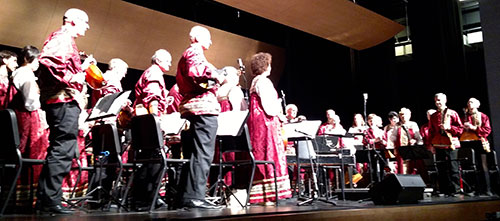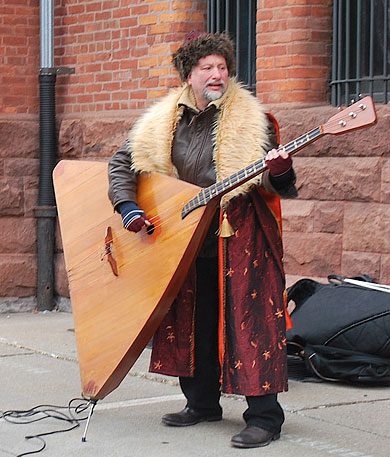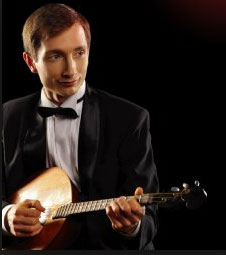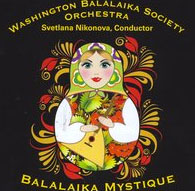Balalaika

This is a season with two anniversaries that are so significant and profound as to mention them before we do anything else.
First is the one that is tantalizingly close but impossibly far away. We all knew someone growing up who had been there when Ike’s Armada steamed across the Channel to disgorge their cargo of young soldiers, and the bombers hummed their way across the gray waters to pin down Rommel’s Panzers, and enable a foothold on Occupied Europe.
I raise a glass to Uncle Dick, the B-17 pilot who took his crew in Buzzin’ Betsy on to his target even though he had lost an engine on take off. He shouldn’t have gone, but he did. My pal Ollie’s Dad was a gunner on ship off the invasion beaches. To them, for that Longest Day, seventy-two years ago this morning.
Then there is the second event, equally heroic in sacrifice but monstrous in horror. On July 1st, a century ago, the British Empire began to draw breath on an event that would undermine the Empire of the King, and eventually finish off the most expansive Empire the world may ever know, unless the Caliphate comes back. The event was the beginning of the Battle of the Somme, an epic bit of foolhardy military strategy that cost the United Kingdom a generation of young men.
All over the British Isles you can see the weathered plaques in the churchyards, and a depressingly long list of souls taken from nearly every village in the land. What came after the war, and the realization of the impact of the loss of 465,000 British and French young men and another 630,000 Germans. Taken with the million who were killed or wounded at Verdun, you can see why Europe is the way that it is today. For the English-speaking world, everything that came after the battle of the Somme had at least a tangential relationship to the slaughter.
After The Somme, there were not enough Brits to go out and man the ramparts of the Empire. India began to slide away, as did the rest of it, gradually, and then accelerating until there was no place on which the sun didn’t set on the Empire. Requisit in pacem, Imperium, along with all those young men, who “lived, felt dawn, saw sunset glow.”
What would our world have been like, had they lived?
What contributions could they have made to a better one?
The slaughter of the Czar and his family was another unintended consequence of the War to End All Wars. I was powerfully reminded of that this weekend, since I was listening to the Real McCoy of how long-ago life sounded in village squares and inside cozy dachas across Mother Russia.
I am privileged to know people who are passionate about their music. My pal Senior Executive Jerry is a tenor in the Choral Arts Society. He knows I don’t like going to the Kennedy Center at night since I have a tendency to lose my car in the vast garage, but he also knows I am good for a matinee to hear a soaring Requiem that brings chills, or a Christmas Concert that brings a joyful noise to the vast Concert Hall. The whole enterprise is a labor of love for the vocalists, since there is pay for them.
I discovered that another pal is in an even more exotic organization, though equally devoted to the preservation of a folk-way that is exotic and filled with Slavic energy. Lisa is a giving person. I knew her because she was foolish enough to give of her time to the most problematic political unit in this nation defined by fierce partisanship: The Condominium Board.
Lisa takes that all in stride, possibly because she has an artistic outlet that is positively picante. She plays the tenor domra in the Washington Balalaika Society. If you have never seen one of their performances, I strongly recommend it for a jolt of authentic folk music that will cause your toes to tap and want to leap up and do something inadvisable.
The WBS was founded in 1988 by a group of Washington-area musicians interested in studying and performing the music of Russia, Ukraine and Eastern Europe on traditional Russian folk instruments. Those include the balalaika, a triangular-shaped mandolin in three sizes, including a gigantic one that is a gigantic presence on stage, the domra in two flavors, Alto and Tenor, the bayan (a chromatic button accordion) and the related folk wind and percussion instruments that add heft and balance to the melody.

There are more than sixty members to play in the two big weekend presentations, and this one was not only a matinee, but it was right down George Mason Drive at the Wakefield High School. It was an opportunity not to be missed.

(Virtuoso Peter Omelchenko)
They brought in a domra superstar from Russia itself, including domra virtuoso Peter Omelchenko, who made magic with the three strings under his talented fingers. The concert was under the direction of Svetlana Nikonova, and supported by solosts Andrie Saveliev, master of the balalaika and Vladmir Zakarevich, master of the bayan.
The venue was great. Arlington has put some decent money into the school infrastructure, and the auditorium had great acoustics, and I got a seat right down front to get the full impact of the WBS Orchestra, which is now the largest of its kind in America.
Lisa could tell you that this is not an inconsequential investment in time and effort. Year round, rehearsals are on Wednesday evenings, when sensible people are at the Front Page restaurant, and there are a lot of Saturday sessions as well.
We watched as the members of the orchestra filed in, the women dressed in traditional scarlet embroidered peasant dresses and white blouses, and the men in trousers with the kosovorotka tunics. They came ready to play, despite having given it their all at the Fitzgerald Theater in Rickville, MD, the night before.
They launched with “Kalinka on a Saturday Night,” a folk medley that made you want to do a shot of Stoli, grab a hunk of black bread and cheese and start dancing. I can’t describe the sound with precision, but you would know it immediately from the hauntingly beautiful strains from Laura’s Theme in the film Dr. Zhivago.
Amazing concert, and the things that Peter Omelchenko can do with three strings is probably illegal in most states. Virtuoso is exactly the right word.
I urge you to remember a great group of people who are keeping a unique folk-way alive.

I picked up a copy of one of their CD’s so I would be prepared for any Cossack-themed festivities that might break out on the patio or down at the farm this summer. My inside sources tell me that the best example is “Balalaika Mystique,” recorded in 2015 and including a joyous, poignant, reflective soulful and completely captivating selection of Russian, Ukrainian, and Eastern European tunes, including the aforementioned theme from Zhivago.
You can download the album, too, but I wanted the disc for greater flexibility.
This is a group whose cause is well worth supporting, and dance-able, too!
Выпьем за то, чтобы у нас всегда был повод для праздника!
Copyright 2016 Vic Socotra
www.vicsocotra.com
